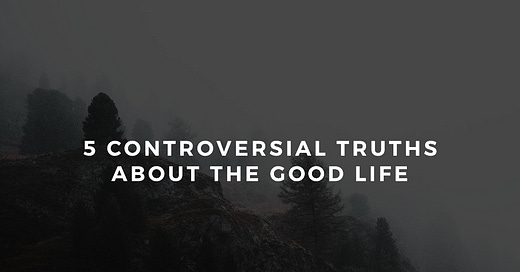Five Controversial Truths About The Good Life
Unpopular life advice the positivity culture won't talk about.
In today’s world, motivational positivity gurus rule the social media meme world. The thing is, though, that not all nice-sounding quotes and memes are true. Nuance just doesn’t work so well.
Here’s a different perspective on five typical positivity messages.
ONE
We are not perfect the way we are.
Regardless of how strongly the self-love movement wants us to view ourselves as perfect human beings, the truth is we aren’t — and we all know it.
Instead of struggling to maintain the narrative that we are perfect in who we are and what we do, why not accept that being flawed and imperfect is an innate feature of being human, not a bug.
True self-esteem grows from acknowledging our flaws but accepting ourselves nevertheless. It comes from accepting that we are not perfect — and being perfectly fine with it. It flows from the continual process of learning and growing as a human being, grounded in appreciation of who we are at every step of the way.
TWO
Quitting is an option.
Winners don’t quit, right? Well, unless they are on a completely wrong path of course.
While it’s true that we often don’t succeed because we’re impatient and not consistent enough, dead ends are real. So are bad paths. Or being stuck in a relationship, in a job, or in a project that’s not good for you. Not all fights are worth fighting. Not all struggles will help you succeed.
As the Buddhists already said:
You can either accept something, change it — or leave it.
Resets are important. Starting over is important. Walking down the hill and taking another route often is the best way to arrive at the top.
Sometimes, quitting simply is an option (just doesn’t sound as good on a motivational meme).
THREE
You can’t achieve everything just by believing in yourself enough.
The Law of Attraction tells you that the universe will conspire to give you what you want if you only align your thought frequency with… okay, stop. That’s just bullshit.
Regardless of how strongly I believe in my ability to fly when I jump from the 33rd floor — I’ll still end up dead. Laws of physics matter, obviously.
But so do luck, circumstance, skills and timing. While believing in yourself most certainly is a prerequisite for achieving extraordinary things, it’s no guarantee. It’s necessary, but not sufficient.
When we fail, it might indeed be the case that we didn’t believe in ourselves enough. But there might be a conglomerate of other factors as well — some of which we’re responsible for, some of which we aren’t.
Focusing only on self-belief only will prevent us from understanding, learning and adapting from our failures — and make us resentful towards ourselves in the process.
FOUR
Your ‘True Self’ doesn’t exist.
Who we are is always in relation to our environments. Without other people, we wouldn't even know how to view ourselves. We take on different roles in different circumstances and with different people.
Of course, we can understand these relationships better through introspection, self-awareness and mindfulness. We can learn what drives us, what makes us happy, how we want to see ourselves, what we actually believe in, what our strengths and weaknesses are, where our flaws hide, and so on — but none of that means there is a True Self, intrinsically on its own, independent of our surroundings.
Society, culture, our whole environment will always define our identity because that's how an identity is formed in the first place. Everything is related. And relations also change over time.
FIVE
Even when it’s not your fault, you’re still responsible.
Whoever or whatever created the situation we find ourselves in (“is at fault”), we are still responsible for dealing with it.
We decide how to take it and how to respond. We decide to take action or refrain from doing so — in any given circumstance, regardless of how it came into existence.
Focusing on fault will tie us to the past, drain our energy, and effectively paralyze us. It's the fastest way into a deadlock, towards feeling completely powerless.
This doesn’t mean that being at fault doesn't matter. Knowing that we are or are not at fault can evoke guilt, regret, frustration, and anger - or relief. And all of these emotions might or might not be helpful in different contexts.
However, if our assessment that someone else is at fault makes us drop everything, we essentially hand over the joystick to someone else saying:
"Here, you play my life for me."
The only way to exercise some authority over the outcomes in our life is to claim responsibility and not expect others to solve our problems. We have to act in the present to move towards a good future.
To Truth,
Phil
If you like this, please use the appropriate buttons and share widely! 🙏🏼





I am grateful to have discovered your site..
So far the insights shared have given me a new perspective..
Thank you..
I look forward to continued updates..
🙏🏾🙏🏾🙏🏾😎